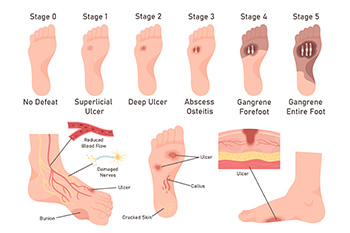
Neuropathic ulcers are serious foot wounds often associated with conditions like diabetes. They develop as the result of nerve damage, which can reduce sensation and lead to injuries going unnoticed. Common symptoms of foot ulcers include localized redness, swelling, and a foul odor. The ulcer itself may appear as an open sore, often located on pressure points like the heel or ball of the foot. Treatment is important to prevent complications, such as infections or amputations. Initial steps include keeping the ulcer clean and dry, often using saline solutions for cleansing. Debridement, or removal of dead tissue, may be necessary to promote healing. Offloading the affected area by using specialized footwear or orthotic devices helps alleviate pressure and facilitates recovery. If you suspect you have a neuropathic foot ulcer, it is suggested you schedule an appointment with a podiatrist. This specialist can provide expert care tailored to your needs and help ensure a successful recovery.
Wound care is an important part in dealing with diabetes. If you have diabetes and a foot wound or would like more information about wound care for diabetics, consult with Imaze Marian Davis, DPM from Marian Davis, DPM, PA. Our doctors will assess your condition and provide you with quality foot and ankle treatment.
What Is Wound Care?
Wound care is the practice of taking proper care of a wound. This can range from the smallest to the largest of wounds. While everyone can benefit from proper wound care, it is much more important for diabetics. Diabetics often suffer from poor blood circulation which causes wounds to heal much slower than they would in a non-diabetic.
What Is the Importance of Wound Care?
While it may not seem apparent with small ulcers on the foot, for diabetics, any size ulcer can become infected. Diabetics often also suffer from neuropathy, or nerve loss. This means they might not even feel when they have an ulcer on their foot. If the wound becomes severely infected, amputation may be necessary. Therefore, it is of the upmost importance to properly care for any and all foot wounds.
How to Care for Wounds
The best way to care for foot wounds is to prevent them. For diabetics, this means daily inspections of the feet for any signs of abnormalities or ulcers. It is also recommended to see a podiatrist several times a year for a foot inspection. If you do have an ulcer, run the wound under water to clear dirt from the wound; then apply antibiotic ointment to the wound and cover with a bandage. Bandages should be changed daily and keeping pressure off the wound is smart. It is advised to see a podiatrist, who can keep an eye on it.
If you have any questions, please feel free to contact our office located in Miami, FL . We offer the newest diagnostic and treatment technologies for all your foot care needs.

